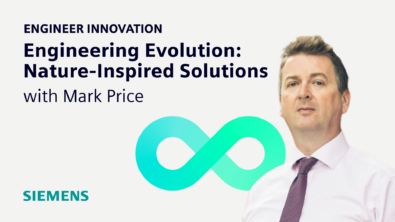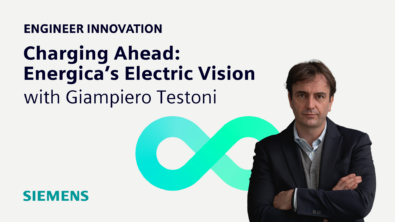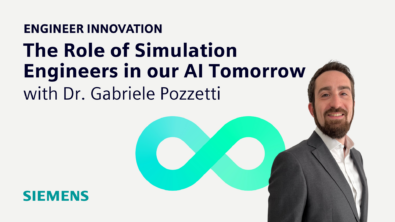Engineer of the future (Episode 3)

In the third episode of the Engineering Innovation podcast, we explore what the “engineer of the future” will look like, and come to the conclusion that we are actually training the engineer of the future today.
When I began studying for my engineering career, just over 30 years ago, the education system was desperate to stick me into a silo. The first choice that I had to make before even applying to university place was whether I wanted to be an Aero Engineer, a Mechanical Engineer, or a Civil Engineer (trust me I was never going to be an Electrical Engineer). By the time I had completed my university degree I had been further driven into a niche, being forced to identify as a “Fluids Guy” rather than a “Structures Chap”.
In today’s world, technological advancements have created a gap between what engineers are expected to do and what they are trained to do.
In the early 1990s, when advanced engineering simulation was still a novelty, that approach still worked well. But the truth is that by 2021 we’ve solved all the easy problems and that the next generation of engineering innovation will require more of a more flexible multidisciplinary approach. The engineer of the future will have to adapt more rapidly, and have better “soft skills” such as “communication” and “collaboration”.
I’m your host, Stephen Ferguson, from Siemens Digital Industries Software. In this episode, I am joined by Remi Duquette, the Vice President of Innovation and Industrial AI at Maya HTT.
Join us as we discuss how rapid changes in technology are impacting the way engineers are trained.
- How AI will impact future engineering jobs (04:15)
- The changes made in how engineers are trained (05:59)
- Why generalization is better than specialization when judging engineering skills today (09:14)
- How engineering skills and AI can be combined to create superior products (13:36)
- How data accuracy impacts the quality of AI-driven decisions (15:34)
- How rapid changes impact the viability of skills possessed by engineers (17:44)
- The importance of learning new skills as an engineer (21:45)
[00:00] Stephen Ferguson: In today’s episode, we’re going to delve into the future of engineering, and more importantly, we’re going to explore what the engineer of the future will look like. Today, I’m joined by Remi Duquette, who’s the Vice President of Innovation and Industrial AI at Maya HTT. Hi, Remi. How are you doing?
[00:15] Remi Duquette: Very well, how are you doing, Stephen?
[00:17] Stephen Ferguson: Good, thank you. So, eventually, we’re going to talk about the engineer of the future. But I wanted to start off by talking about the engineer of the past. Now, I don’t know how long you’ve been in engineering but I’m thinking that the engineer of the past is looking a bit like guys like you and me, Remi. So, can you tell us a bit about your background and how you got here?
[00:36] Remi Duquette: Well, my background is probably not atypical in terms of engineering. In the ‘90s, I did my engineering degrees and graduated from the McGill University of Toronto, and went into aerospace engineering. So, that really was was my background. And stayed the course for probably about a decade in aerospace engineering, and then moved on to the software engineering world; developed all sorts of funky and fun applications. And now I’m in charge of innovation at Maya HTT. We develop multiple software solutions for different engineering domains, not just the space – although we did start in space but we now are developing software for about 12 to 15 different industries with experts in each of them. And in the last decade, I really moved on to AI and Machine Learning as a practice within our company. So, this is really an evolving world, and I could see it’s rapidly changing. And the pace, certainly in the future, is probably going to be a little bit faster than it was in the last three decades. But that’s been kind of my road to where I am today.
[01:47] Stephen Ferguson: Certainly it’s changing at a really, really rapid pace. We’re going to talk about engineering here, but it’s affecting everybody as well. So, look at my kids, who are eight and nine at the moment, and you think, “In 10 years’ time, would they normally be learning to drive? In 10 years’ time, people might not be doing that anymore, that might be a completely redundant skill.” It’s kind of a rite of passage for people like us. And so you can see these kind of whole swathes of existing skills which might just disappear because they’re going to be taken over by AI. Is that what you see is happening?
[02:15] Remi Duquette: Well, certainly, as you mentioned, there are some skills that will be made obsolete by some of the new technologies that are emerging – some are a little bit scary thoughts. And we’ll have to see how they evolve, and if it’s as rapid as we think it will be. But certainly, there will be some rapid change. And I see my nine-year-old as well. She’s at a summer camp coding today. And it’s like, “Well, I didn’t have a computer at her age,” because computers were starting up, but not really widespread at the time. So, it’s kind of an interesting thought to see how rapidly these changes will occur. But yes, I’m certainly bracing for a lot more of those changes. And that’s why I think the future of engineering is important and a really critical topic to address because the engineers we trained today, we can’t over-specialize them on specific technologies because we know those may not be available in five years time because they keep on changing.
[03:14] Stephen Ferguson: So, how did you think the AI is going to affect future engineers’ jobs?
[03:18] Remi Duquette: In two ways. AI is really a technology – a new way of dealing with data and learning from data. But I mean, engineers have used data in the past, whether it’s in controllers, in the manufacturing space, or in operations. So, it’s not really a new topic. It’s been made a lot more powerful by to compute that we have and the amount of data that we can process and that we have at our fingertips, whether it’s from real-time telemetry or additional data sources that we can tap into. But AI will change engineers and in a couple of ways. One, in augmenting them and augmenting their capability. Of course, it’s going to change the way that we think of a design cycle in engineering or a product. And if you look in the past, engineers typically would conceptualize something new, optimize it, and then produce it. And once it’s out the door, they would kind of forget about it by and large. Nowadays, that product sends telemetry back home, so to speak, and tell you new things in the environment that you may or may not have put in your design in the first place. So, it brings new ways to think about how to iteratively design and put forward some interesting new ways of coming up with amazing new products that we couldn’t conceive before. So, that feedback loop that’s a lot more rapid; and real-time; and giving us, as engineers, a lot more tools and interesting information to deal with is definitely going to change the way we go about our job. That’s clear.
[04:58] Stephen Ferguson: Do you think that current engineering education reflects that as well? Because I remember when I was at university, which is like 30 years ago – it’s a long time. But it was very prescriptive. We were having to find the solutions to problems that had a solution. Then you go into industry, and you’re trying to solve difficult problems that might not have a solution or require innovative solutions. So, do we think that the engineering graduates today are having the correct training to play a part in this future of engineering?
[05:25] Remi Duquette: They are, certainly. And I’ve been on many interesting discussions and conferences with a lot of people that are teaching our kids engineering today. And it’s quite interesting in terms of, in the past, the focus was really more, as you mentioned, in problem-solving skills. And I’m going to call them mad maths skills, technical knowledge, and logical reasoning and thinking, and that kind of skills. And as we look to the future, we’re at a crossroad where generalization versus specialization is what they have to grapple with. And it’s always similar, in a way, in analogy to AI; if you overtrain and overspecialize a little model, well, at some point it just does not generalize very well. And they can’t adapt very well. So, it’s the same thing for training engineers in the way. Now, you have to give them other skills like communication skills and team player skills. Because in the past, you perhaps, in a mechanical environment, would deal with structural dynamics and maybe temperature heat transfer type problems. Now, you have to deal with mechatronics, and wire harnesses, and all sorts of things that perhaps in the past didn’t entangle themselves as much as they do today in every product. So, the attention to those kinds of creative skills, and communication skills, and natural curiosity skills, and constant learning and relearning new topics, I think is really where our educational system is going, fortunately, because they’ve realized that they can’t overspecialize someone because they’re going to make them obsolete very quickly, and they’re about making these engineers being resilient in the long term. So, I think there is a wave of change in the education system. But it’s still a bit lagging, of course. The same way in the industry as well, because we were faced with these new technologies that are evolving at a pace that we have not seen. If I had told you that we would be contemplating self-driving cars 10 years ago, you would have laughed at me. But now we’re getting closer and closer to that reality, and people are not laughing anymore, and they’re investing a significant amount to make it happen. So, that’s really the point there on specialization versus generalization of engineers. And it’s definitely moving from pure mad math skills to really adaptive skills that will make you a really sound engineer that will be able to evolve with the pace of technology and adapt with new technologies as new tools, really, to use in your daily job.
[08:14] Stephen Ferguson: So, I guess, proper engineers as well, I guess, guys like you and me. I’m an aero engineer like you and I left university and got a job in computational fluid dynamics. And that’s all I ever did. I learned how to use the specific tool. I spent the next 10 years being an expert in using that tool. We sat in the same office as people doing structural analysis, and I kind of understood what they did, from what from my university education but I had no real insight. And I think you get the feeling that all those simple problems, which were just fluid mechanics or just structure mechanics have been solved, and the next generation of engineering innovation is going to depend on people who can do all of those things, and communicate the results because that’s really important too. Because solving a problem is not enough because you have to be able to communicate the solutions to your problems, to stakeholders who are probably not specialists in CFD or FEA or any of these other tools that people build their careers around.
[09:07] Remi Duquette: A hundred percent on point. In the past one domain and specialization in whether it’s CFD or heat transfer, I mean, my background was really in structural dynamics for spacecraft, but it was a narrow niche of skills, really, that I applied for at least a decade back then. But now we’re talking about a lot more complex interactions, multiphysics solutions. Like at Maya, we develop a lot of multiphysics software and solutions, and we have to think and mind those very intricate workflows from the mechanical side, electrical side, and mechatronics, and systems engineering, and all the rest of it that needs to come together. So, that specialization may still exist in some domains. I’ll give you an example of the nuclear industry. Well, having a nuclear engineer is probably a really good thing because you need specialized people in those domains to make it work. But in other domains, and in most other domains, you will not need those specializations, but you’ll need people that are more general and team players that can interact with multiple people that each has a certain degree of specialization. But the key characteristics they will bring to the table is being able to augment themselves and work together as a team and work with new technologies to augment themselves as well. So, not just human beings as team players but AI as a way, whether it’s an engineering chatbot, or an engineering multiphysics optimization, or generative adversarial network that will give you some new samples and new ways of designing – those are all narrow tools and people skills that you’re going to put the contribution in your work.
[10:56] Stephen Ferguson: I’ve always felt that the problem with the engineering that I do is you spend your whole career in trying to drive the software as much as anything else, and not enough time doing real engineering. And I’m guessing the AI is going to free engineers up to do proper engineering – making decisions, giving insight – and not just be; we used to call the mesh monkeys in our day, but just being people who drive the software. Because that’s how I made my career, and I regret that I had to spend not enough time solving real engineering problems and just solving part of them. Is that how you see things are going to go?
[11:31] Remi Duquette: I definitely see that as a trend. And certainly AI, as a technology, does bring those insights – it kind of bubble to the surface, those insights – that may have been hidden in the data or in the software, as you say, per se. So, instead of having engineers and humans going through and sift through all of this, relatively speaking, it’s still a newer field even today. But I know it’s expanding very rapidly. But this idea of generative type AI programs that will give you the best couple of solutions, and then you will apply your engineering judgment to pick the right one. I mean, it’s still going to be a probability game where AI brings about what’s most probable, and people need to think in a different way in those environments. But I do see that trend, certainly, increasing in the future.
[12:36] Stephen Ferguson: And also support the ridiculous solutions that are not feasible. Because I think maybe that will go away as AI improves. But at the moment, sometimes, you go through some sort of optimization study, and you’ll see at the end, you get some brilliant solutions but also some completely unfeasible solutions. And I guess we still rely today on engineers sometimes to spot the things that are completely unfeasible.
[12:59] Remi Duquette: Well, I mean, it’s not just unfeasible but dangerous sometimes. But you see it in all sorts of things, and that’s why AI needs to be understood and harnessed in the proper way. AI, again, is purely and simply a new tool in terms of its power. It’s been there in terms of algorithms for Machine Learning, and Deep Learning has been there for, now, two decades. So, we’ve seen it evolved in brilliant ways in some ways, but in other ways, we see that based on the data that you use, if you use Twitter and a bunch of things to train a chatbot, well, you might train a chatbot that’s not so adequate or not so correct in the way that it uses language. And you see even the more recent things in the last year that have put trillions of new increased neural networks and neurons in those big AI models for language processing. And you can still see that it doesn’t get it right in many instances. So, I think engineers will be augmented by this technology. And the technology will be put to good use by engineers by using it properly. And that’s the key, really, it’s that combination. And I see it, for at least the decades to come, as really that combination of humans being augmented by technology and technology being used in the proper way in augmenting people. So, that’s really my hope and what I’m seeing in any way as a trend moving forward for engineering practices using AI.
[14:34] Stephen Ferguson: And not forgetting, of course, that human engineers often make bad decisions. And sometimes you’re going to need AI to pick up those decisions as well. I think that happens anyway. And I think a proliferation of automated driving systems which you’re going to see in the next 10 years, is probably going to demonstrate the humans are not really good drivers, and that actually, AI systems are rather better. I’ve listened to a really excellent podcast by Malcolm Gladwell talking about the Waymo cars. And he was basically saying that the reason why pedestrians don’t run out in the road is because they don’t trust drivers not to run them down. But as soon as we get this kind of next generation of automated ultra-safe vehicles that always stop for pedestrians and never hit pedestrians, it’s going to change the contract between pedestrians and the cars themselves to the extent that you just be able to walk out in front of cars because you’re never going to get one over. And once you can do that, then the pedestrians kind of own the road again as well. So, there’s going to be some really intriguing changes, I think, in everyday life, which are down to AI. So, it’s an exciting future, isn’t it?
[15:36] Remi Duquette: It is very exciting. And I listened to that podcast as well. And it is very interesting to see how it will evolve. But we also have to be recognizing that AI is fed through sensor data, and sensors are not, let’s say, 100% without failures. So, although there will be redundancy built in how we feed those AI models, there’s always a probability – or low probability, but a probability – that these things will go right not because the model is wrong but because the input might get a little bit mangled if you think of crossing the street in front of a car. I think it will take a little bit more time before people realize, “Okay, well, it’s not just the AI model, it’s also the sensors on that specific car that you’re walking in front of.” And so people need to be still a little bit cautious not because AI is not better than humans at that task – because AI is, it’s been proven multiple times over now – but it’s still going to rely on sensors that could get faulty. So, we need to be, at least, sensitive and careful.
[16:44] Stephen Ferguson: So, we’re not advocating anybody running out in front of automated cars just yet?
[16:48] Remi Duquette: No, not yet.
[16:51] Stephen Ferguson: So, I just want to go back to this idea of lifelong learning. Because as I was researching this as well, I came across a talk by a guy called James Plummer, who’s a former Dean of Engineering at Stanford. His talk is called “The Engineers of the Future Will Not Resemble the Engineers of the Past.” And he, basically, has this little bit, he says, “Careers becoming global and unpredictable, lifelong learning is essential,” which is kind of agreeing what you’re saying as well. And he made this really challenging statement saying that the half-life of engineering knowledge is three to five years, which really makes you think because lots of us spend at least three years of our life at university. And if our engineering knowledge is moving that quickly, it’s worrying for engineers. Do you think that the half-life of engineering knowledge is more than three to five years? Or do you think he’s got it about right?
[17:42] Remi Duquette: It is a controversial statement, of course, and it’s there to engage in conversation. I think that the engineering knowledge is still going to last more in terms of if you teach the right thing. Of course, if you teach a specific technology, then, yes, I agree with that statement that if you overspecialize in a specific – whatever it is – software that you use for AI, it may or may not be relevant five years from now. So, if you align the engineering skill with the technology that you teach, then that’s correct. But there are fundamental principles that won’t change. I mean, the physics on our planet has not changed for many decades, and it’s not about to change, at least not rapidly. So, in terms of becoming a craftsman, in terms of understanding how radiative heat transfer, or airflow, or temperature distribution, or dynamics of systems, impact, the design – that, by and large, is not going to change all that much. Now, what changes is the way you address the dynamic of a system if you use a generative adversarial network, or if you’re going to do a 3D printing technique to manufacture the component, it brings all sorts of new possibilities of structures that you probably have never seen in your life because it’s so organic and funky looking. And down to your shoes, where you put sensors in your shoes to run faster and all that. So, of course, things are changing in terms of how they materialize in the real world, but physics and the understanding of physics and logic is still required, and that is not about to change. So, I think we have to take that comment with a grain of salt in terms of, I think, he’s partially right, but he’s also partially wrong because there is a 50%-60% of your knowledge that will be reusable because it’s really building on bricks of logics and physics that that will not change.
[19:41] Stephen Ferguson: So, you’re saying we still need the hard skills, but we just got to build all the soft skills on top right?
[19:46] Remi Duquette: Correct. And the adaptation then he’s right in terms of becoming a craftsman is also augmenting in shortening and in terms of span. It used to be that it took a lifetime to become a craftsman at anything. Whereas today with all the training that we have, and the techniques and the technology that we have, we can augment ourselves to become maybe not a craftsman but an expert or a specialist at many things over the lifetime. So, in terms of becoming a craftsman or an expert, I think, what he’s saying is also in reverse equally true that we will, perhaps, master four or five things in our lifetime instead of one. And that’s because of the augmentation of either AI or other technologies data that will help us become more quickly experts in any given field.
[20:45] Stephen Ferguson: Which makes engineering careers seem even more exciting than they are already I think, have all these extra opportunities to learn and evolve. One thing that occurred to me, actually, is when we’re talking about the engineers of the future, I realized that I think next year, I will have graduated 30 years ago. So, I think, when we talk about the engineers of the future, I still have about 30 years, maybe I’ve got another 10 years left, but when we talk about the engineers of the future, actually, those are the engineers that we’re training today, because if you graduate next year, basically, you’re still gonna be working in 2060, or maybe even 2070, by which time the world will have changed completely. With all this climate emergency stuff going on, maybe we won’t be here around here at all. So, I think we have to start teaching these skills now, don’t we? I guess it happens naturally, but the future starts now.
[21:31] Remi Duquette: It does start now. And actually, it starts with even us. You and me. I’ve graduated two decades ago now. So, it’s 20 years into the industry and doing fun stuff. But I keep on learning. Every year, I make a point of learning, whether it’s a small or big skill, a new skill, to put in my arsenal of skills. I hate to quote someone like Einstein, but, “Once you stop learning, you start dying.” And that’s really, I think, what needs to push all of us forward is to continuously learn and continuously upskill ourselves to stay relevant in our fields, and continue to have fun doing all sorts of interesting engineering with the new tools and technologies that become available and as they become available. So, that’s certainly a great way of looking at it. But certainly, it starts today, in terms of the new kids that are in the school, we need to give them the general foundational hard skills, but teach more of the soft skills so that they can adapt and be a lot more resilient than we are.
[22:40] Stephen Ferguson: Which actually brings me on to my final question. So, we talked about the engineers of the future who are training now. But the guys like me and you, kind of dinosaurs, are we on the verge of extinction? I think we can all continue to learn and adapt, can’t we? I think that’s part of being an engineer.
[22:54] Remi Duquette: Yeah, I think we’re all practical beings. And if you’re like me, toying around with all sorts of stuff. I mean, if you went into engineering for the right reasons, you’re probably someone who’s very curious. And curiosity means that you’re probably going to upskill yourself and train yourselves into all sorts of new topics that are emerging, whether it’s collaborating with robots. I mean, clearly, robots didn’t exist when we were training back 30 years, 20 years ago, or at least they were nowhere near the shapes that they are today. And we didn’t have to deal with drones and all sorts of machine vision components that we can deploy at scale in different industrial or manufacturing environments. So, I don’t think we’re going to be made obsolete if we went into the engineering profession for the right reasons, because we were just playing curious and have a good logical and math background to bring to the table.
[23:56] Stephen Ferguson: That’s a massive relief for me. So, I just want to say thank you very much for joining us today and convincing us that I think the future is bright for engineers as well. So, thank you very much, Remi. Goodbye.
[24:07] Remi Duquette: My pleasure. Thank you.
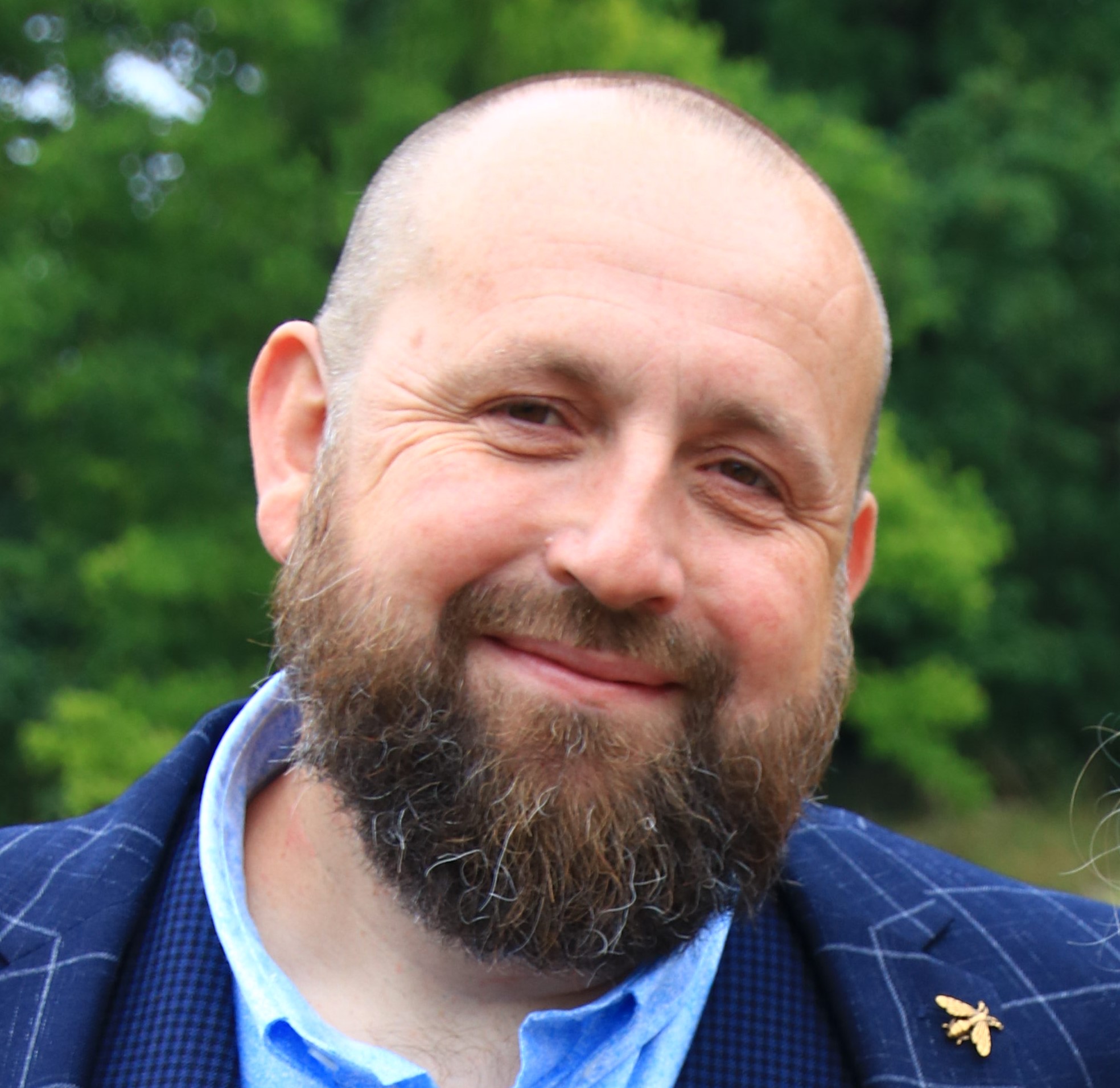
Stephen Ferguson, your host
Stephen Ferguson is a fluid-dynamicist with more than 25 years of experience in applying advanced simulation to the most challenging problems that engineering has to offer for companies such as WS Atkins, BMW and CD-adapco and Siemens. He has never tried to stand up on a surfboard.
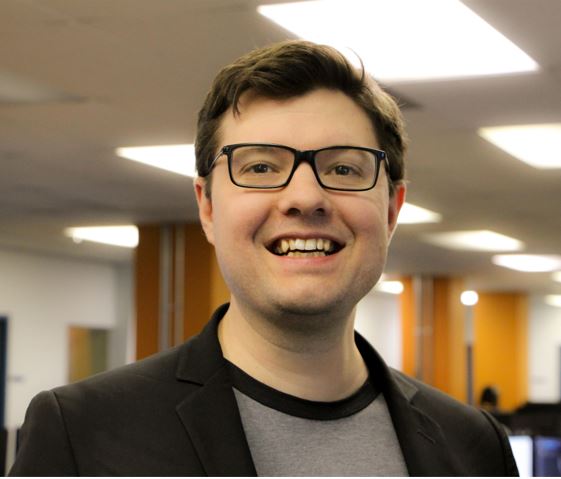
Remi Duquette, Vice President – Innovation & Industrial AI, Maya HTT
With 20 years of experience building practical, effective solutions, Remi now plays a key role in heading Maya HTT’s industrial IoT and AI solutions strategy and innovation. He is a sought-after guest speaker with dozens of successful industrial AI/ML/simulation projects to his credit. From his achievement as a young short-track speed skating champion, to his instrumental contributions to successful industrial AI-operations deployments, to the structural design and analysis of five spacecraft currently in orbit, when it comes to “mission-critical”, Remi is an asset to all our Maya HTT clients.
Stuff to watch:
Good reads:
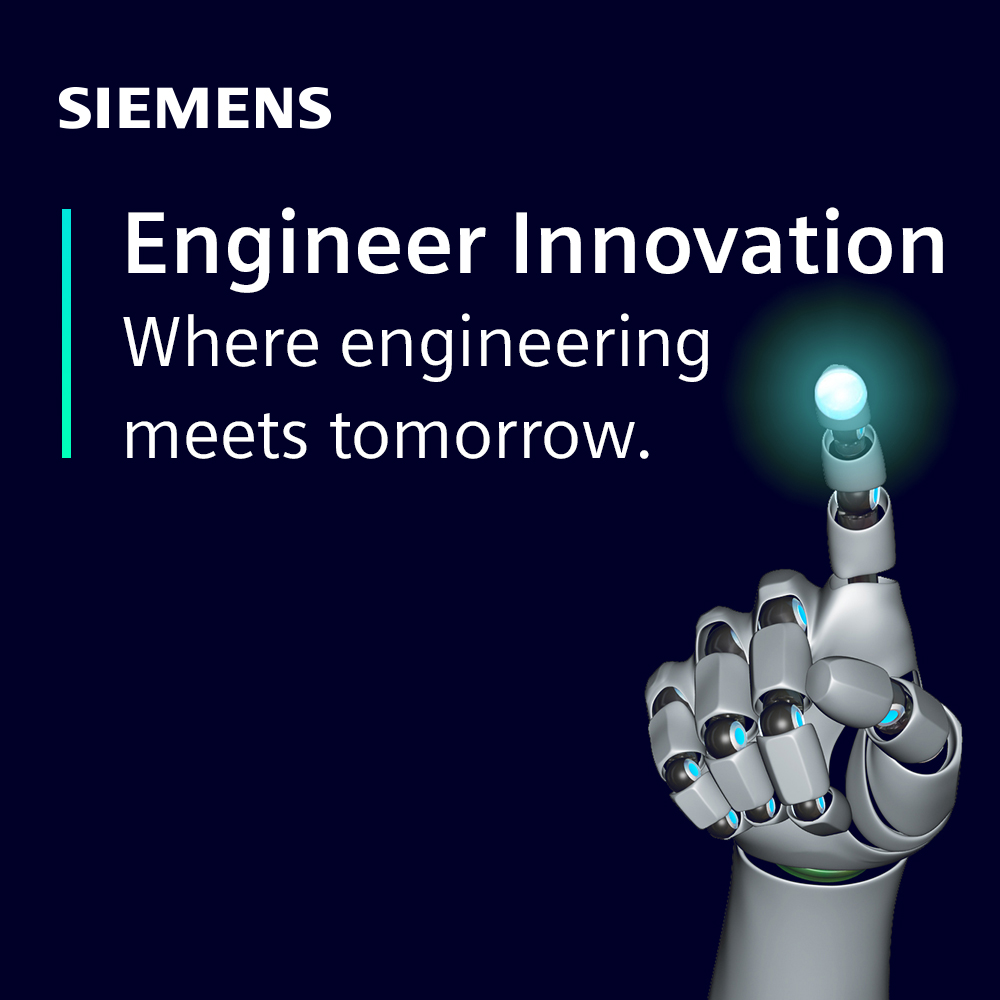
Engineer Innovation Podcast
A podcast series for engineers by engineers, Engineer Innovation focuses on how simulation and testing can help you drive innovation into your products and deliver the products of tomorrow, today.
